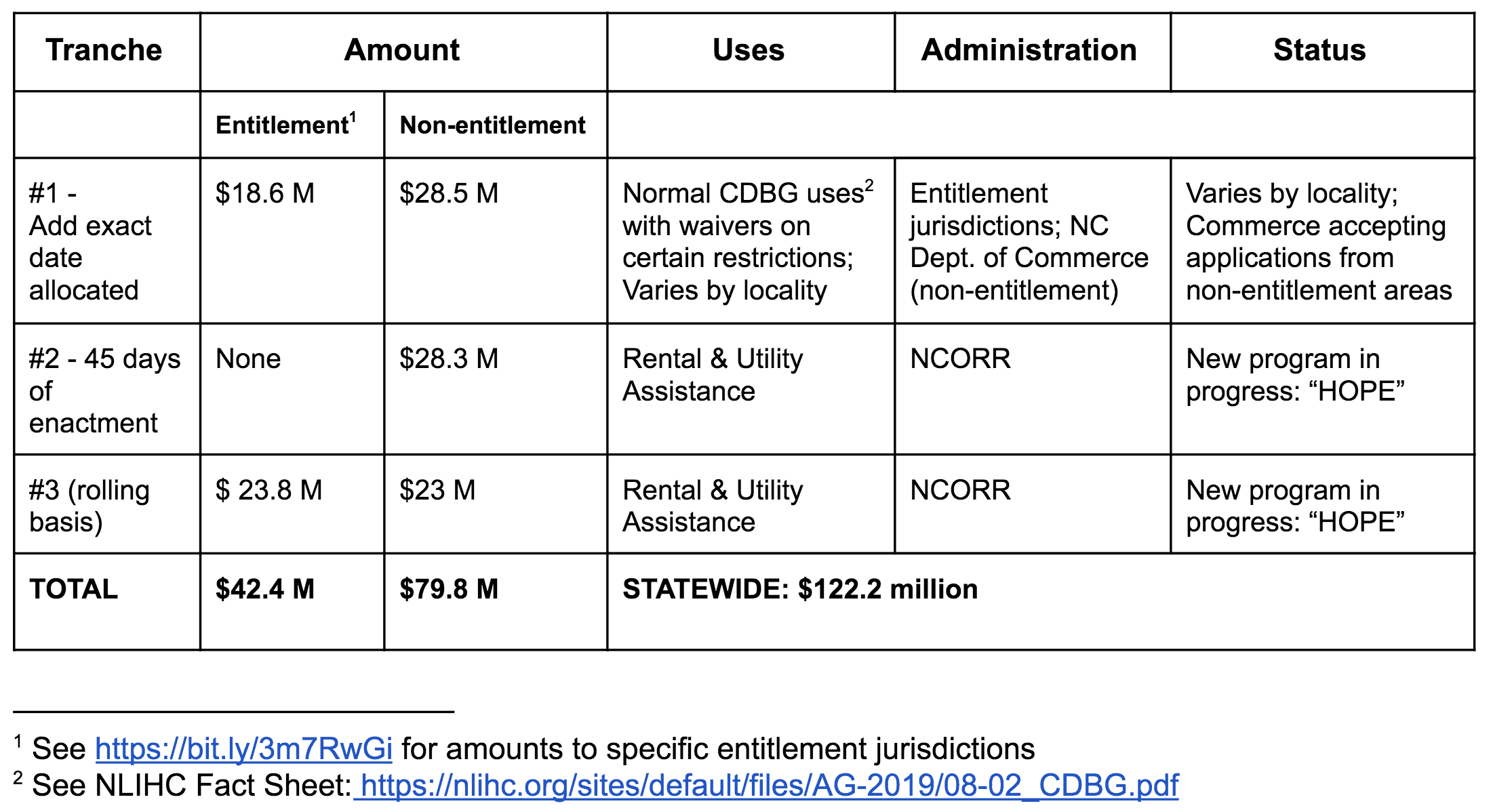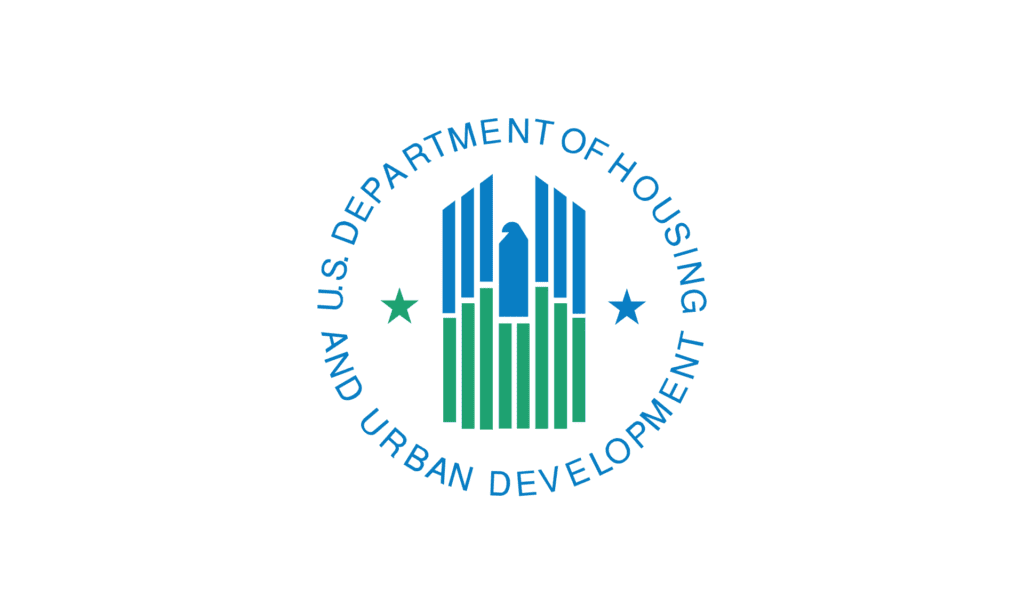
On March 27th the President signed into law the CARES Act (Coronavirus Aid, Relief, and Economic Security Act), which includes $5 billion in Community Development Block Grants (CDBG-CV) funds deployed by the Department of Housing & Urban Development (HUD) in three tranches to both state governments and directly to some local governments. The first tranche allocates funds to entitlement jurisdictions (local governments) and to states for distribution to non-entitlement areas following HUD’s usual formulas. The second and third tranches allocate funds according to amounts derived from unique formulas taking public health and coronavirus case data into account.
On September 11th, HUD announced the allocation amounts for the third and final tranche. North Carolina will be receiving an additional $46.8 million in CDBG-CV (non-entitlement & entitlement), bringing the statewide total to over $122 million.
- Tranche # 1: $47.1 million total statewide
- $18.6 million – Entitlement areas
- $28.5 million – Non-entitlement areas
- Tranche # 2: $28.3 million for use in entitlement & non-entitlement areas
- Tranche # 3: $46.9 million statewide
- $23 million – Non-entitlement areas
- $23.8 million – Entitlement areas
The table below details where and how these pots of CDBG-CV monies are being deployed across the state – who is administering them and for what purposes.

HOPE: New $117 Million Rental/Utility Assistance Program
Of North Carolina’s CDBG-CV funds, $51.3 million (tranche #2 & 3) will be administered by the NC Office of Recovery & Resilience (NCORR) to provide individuals with rental and utility payment assistance as part of the state’s efforts “to prevent, prepare for, and respond to” coronavirus impacts.
The new program, Housing Opportunities to Prevent Evictions (HOPE), announced by Governor Roy Cooper on August 25th combines the state’s $51.3 million in CDBG-CV funds with $66 million in Coronavirus Relief Funds (also from the federal CARES Act) for a total of approximately $117 million. NCORR intends to build off of the existing infrastructure of the Back@Home program by which individuals are screened at a central contact point and then directed to the appropriate local partner agency that will administer necessary assistance.
Eligibility: Households with incomes between 50-80% of Area Median Income (AMI)
Covered Expenses:
- Rent: No more than 6 months worth of payments with no cap on total dollar amount, including arrearages
- Utilities: Past due amounts only, including alternative payment plan arrangements; “Essential” utilities only, such as electricity, natural gas, propane, water, and sewer;
- Amounts due from April 1, 2020 onward
Application Process: Details yet to be finalized. Applicants will self-certify that they have been financially impacted by COVID-19 (i.e. job loss, wage loss).
NCORR expects to have the HOPE Program up and running in the coming weeks. Payments will be provided on behalf of individuals directly to landlords, property management companies, or utility providers. Rental providers who receive payments must agree to certain conditions such as:
- Agree not to evict tenant for duration of tenant’s lease
- Agree not to raise rental amount within certain timeframe
- Agree not to impose additional fees or penalties for nonpayment of rent for remainder of lease period
For more details on NCORR’s program please visit our past Housing Calls with NCORR staff members: 8/18 call with Laura Hogshead; 9/22 call with Haley Pfeiffer-Haynes.
Funds Available through NC Dept. of Commerce
Approximately $28 million in CDBG-CV will be administered to non-entitlement areas by the NC Department of Commerce to help non-entitlement areas “prepare, prevent, or respond to” COVID-19 impacts. The Governor’s Office encourages localities to use the funds for rental or utility assistance, however, ultimately those activities will be determined by the locality. Activities should be critical to the community and serve low- and moderate-income residents. Applications are currently being accepted and will be awarded on a rolling basis. For more application details visit Commerce’s CDBG-CV website.
Entitlement Area Uses – Variety of Programs
Entitlement areas are able to similarly shape programs to “prepare, prevent, or respond to” COVID-19 impacts. Localities may use the funds for housing assistance or other qualifying activities typical of CDBG. Among those providing rental, utility or mortgage assistance include the City of Greensboro, the City of Fayetteville, and the City of Charlotte. Many other areas are in the process of outlining their uses of CDBG-CV funds. You can learn more about Fayetteville’s program from our 8/11 Housing Call.
What Now?
With all CDBG-CV resources being appropriated and the NC General Assembly also having appropriated the state’s remaining federal coronavirus relief funds, there remain several gaps, notably mortgage assistance for struggling homeowners, housing counseling and legal services. Hundreds of thousands of North Carolinians are estimated to be at-risk for eviction. The CDC order halting evictions, while useful in keeping people housed, does do nothing to alleviate the debts owed by renters and provides no assistance to housing providers in meeting their operational and financial obligations, such as mortgage payments, property taxes, and needed repairs. Additionally, the order is being applied in an uneven and inconsistent manner across the state and country. With a COVID-19 vaccine or cure unlikely until well into 2021, the economic and health impacts will continue to be felt. Existing racial and income disparities around housing security and financial resources will only become even more entrenched if the government fails to meet the needs to ensure people are able to stay housed.
It is imperative that Congress pass additional relief measures, such as the $100 billion for rental assistance that is included in the HEROES Act. Please contact your House members and Senators Burr and Tillis to urge them to support additional relief for housing in North Carolina. Go here to find NC’s delegation.








